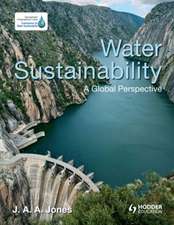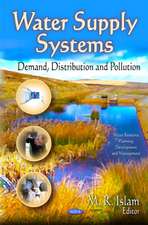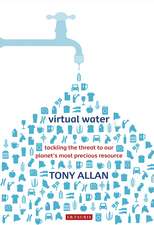The Global Water System in the Anthropocene: Challenges for Science and Governance: Springer Water
Editat de Anik Bhaduri, Janos Bogardi, Jan Leentvaar, Sina Marxen Limba Engleză Hardback – 26 aug 2014
| Toate formatele și edițiile | Preț | Express |
|---|---|---|
| Paperback (1) | 734.27 lei 6-8 săpt. | |
| Springer International Publishing – 10 sep 2016 | 734.27 lei 6-8 săpt. | |
| Hardback (1) | 794.88 lei 6-8 săpt. | |
| Springer International Publishing – 26 aug 2014 | 794.88 lei 6-8 săpt. |
Din seria Springer Water
- 18%
 Preț: 896.08 lei
Preț: 896.08 lei - 18%
 Preț: 956.03 lei
Preț: 956.03 lei - 24%
 Preț: 2377.21 lei
Preț: 2377.21 lei - 15%
 Preț: 653.14 lei
Preț: 653.14 lei -
 Preț: 361.56 lei
Preț: 361.56 lei - 18%
 Preț: 1877.02 lei
Preț: 1877.02 lei - 18%
 Preț: 1113.09 lei
Preț: 1113.09 lei - 18%
 Preț: 915.79 lei
Preț: 915.79 lei - 15%
 Preț: 659.70 lei
Preț: 659.70 lei - 15%
 Preț: 649.71 lei
Preț: 649.71 lei - 15%
 Preț: 648.42 lei
Preț: 648.42 lei - 15%
 Preț: 652.49 lei
Preț: 652.49 lei - 18%
 Preț: 960.78 lei
Preț: 960.78 lei - 18%
 Preț: 787.78 lei
Preț: 787.78 lei -
 Preț: 391.99 lei
Preț: 391.99 lei - 18%
 Preț: 949.55 lei
Preț: 949.55 lei - 18%
 Preț: 1005.29 lei
Preț: 1005.29 lei - 15%
 Preț: 646.75 lei
Preț: 646.75 lei - 15%
 Preț: 649.22 lei
Preț: 649.22 lei - 15%
 Preț: 648.05 lei
Preț: 648.05 lei - 18%
 Preț: 791.71 lei
Preț: 791.71 lei - 15%
 Preț: 646.43 lei
Preț: 646.43 lei - 18%
 Preț: 903.17 lei
Preț: 903.17 lei - 18%
 Preț: 1234.77 lei
Preț: 1234.77 lei - 15%
 Preț: 649.06 lei
Preț: 649.06 lei - 15%
 Preț: 661.97 lei
Preț: 661.97 lei - 18%
 Preț: 974.04 lei
Preț: 974.04 lei - 15%
 Preț: 650.86 lei
Preț: 650.86 lei - 18%
 Preț: 977.80 lei
Preț: 977.80 lei - 15%
 Preț: 665.08 lei
Preț: 665.08 lei - 18%
 Preț: 948.79 lei
Preț: 948.79 lei - 18%
 Preț: 952.72 lei
Preț: 952.72 lei - 24%
 Preț: 698.86 lei
Preț: 698.86 lei - 15%
 Preț: 647.73 lei
Preț: 647.73 lei - 15%
 Preț: 638.76 lei
Preț: 638.76 lei - 18%
 Preț: 785.42 lei
Preț: 785.42 lei - 15%
 Preț: 645.28 lei
Preț: 645.28 lei - 15%
 Preț: 640.88 lei
Preț: 640.88 lei
Preț: 794.88 lei
Preț vechi: 969.37 lei
-18% Nou
Puncte Express: 1192
Preț estimativ în valută:
152.12€ • 158.23$ • 125.58£
152.12€ • 158.23$ • 125.58£
Carte tipărită la comandă
Livrare economică 12-26 aprilie
Preluare comenzi: 021 569.72.76
Specificații
ISBN-13: 9783319075471
ISBN-10: 3319075470
Pagini: 180
Ilustrații: XVI, 437 p. 70 illus., 26 illus. in color.
Dimensiuni: 155 x 235 x 30 mm
Greutate: 0.81 kg
Ediția:2014
Editura: Springer International Publishing
Colecția Springer
Seria Springer Water
Locul publicării:Cham, Switzerland
ISBN-10: 3319075470
Pagini: 180
Ilustrații: XVI, 437 p. 70 illus., 26 illus. in color.
Dimensiuni: 155 x 235 x 30 mm
Greutate: 0.81 kg
Ediția:2014
Editura: Springer International Publishing
Colecția Springer
Seria Springer Water
Locul publicării:Cham, Switzerland
Public țintă
ResearchCuprins
Foreword.- Preface: The Global Water System in the Anthropocene.- Part I – Global Water System: Current State and Future Perspectives.- Part II – Dimensions of Change in River Basins and Regions.- Part III – Ecosystem Perspectives in Water Resources Management.- Governing Water in the Anthropocene.
Textul de pe ultima copertă
The Global Water System in the Anthropocene provides the platform to present global and regional perspectives of world-wide experiences on the responses of water management to global change in order to address issues such as variability in supply, increasing demands for water, environmental flows, and land use change. It helps to build links between science and policy and practice in the area of water resources management and governance, relates institutional and technological innovations, and identifies in which ways research can assist policy and practice in the field of sustainable freshwater management. Until the industrial revolution, human beings and their activities played an insignificant role influencing the dynamics of the Earth system, the sum of our planet‘s interacting physical, chemical, and biological processes. Today, humankind even exceeds nature in terms of changing the biosphere and affecting all other facets of Earth system functioning. A growing number of scientists argue that humanity has entered a new geological epoch that needs a corresponding name: the Anthropocene. Human activities impact the global water system as part of the Earth system, and change the way water moves around the globe like never before. Thus, managing freshwater use wisely in the planetary water cycle has become a key challenge to reach global environmental sustainability.
Caracteristici
Connects science with policy Presents the state-of-the-art of global water science Provides river basin case studies as "laboratories" for developing, testing and monitoring experience with integrated methodologies Includes supplementary material: sn.pub/extras











